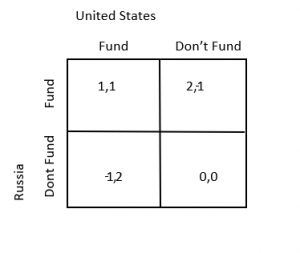The Space Arms Race
Link: https://www.defenseone.com/technology/2018/09/spacex-well-consider-launching-space-weapons-if-asked/151328/
Yesterday (9/17/2018), the president of SpaceX confirmed that it would definitely consider launching weapons into space if it meant protecting the US. This news came at the Air Force Association’s national conference, and was unsurprisingly met with an applause. Should this come as a surprise to us? It’s no secret that the U.S. is interested in space warfare. In fact, the world’s superpowers (namely the U.S. and Russia) have been competing for military control of space since as early as the start of the Cold War in the 1950’s. What would investing in a space force accomplish for either the U.S. or Russia? This article specifically addresses the fact that developing technology would allow the U.S. to intercept missiles using particle beams and or ray guns. There is a clear connection between this and our Networks course.
In principle, Game Theory addresses situations where the outcome of a player’s decision depends on how they choose among several options, AND on the choices made by the people they are interacting with. In this case, the players are the United States and Russia. There are many options we could consider for the space race, but for the sake of simplicity we will limit the countries to two choices: funding a space force and not funding a space force. If one country funds a space force and the other doesn’t, the country that did fund will be much better off and the country that did not will be at a disadvantage. If both countries fund a space force (we are assuming equal allocation of resources for simplicity), then they have kept each other from taking full military control of space, and are thereby better off. If neither the U.S. nor Russia funds a space force, then there is not a clear payoff for either country. Using this information, we can easily tabulate these outcomes as follows.
The dominant strategy Nash Equilibrium for this game we have created is for each country to fund a space force. Intuitively this makes sense— why would either country risk allowing their opponent total control of the space above them? This would come with a heavy cost to national security and influence over global politics.

